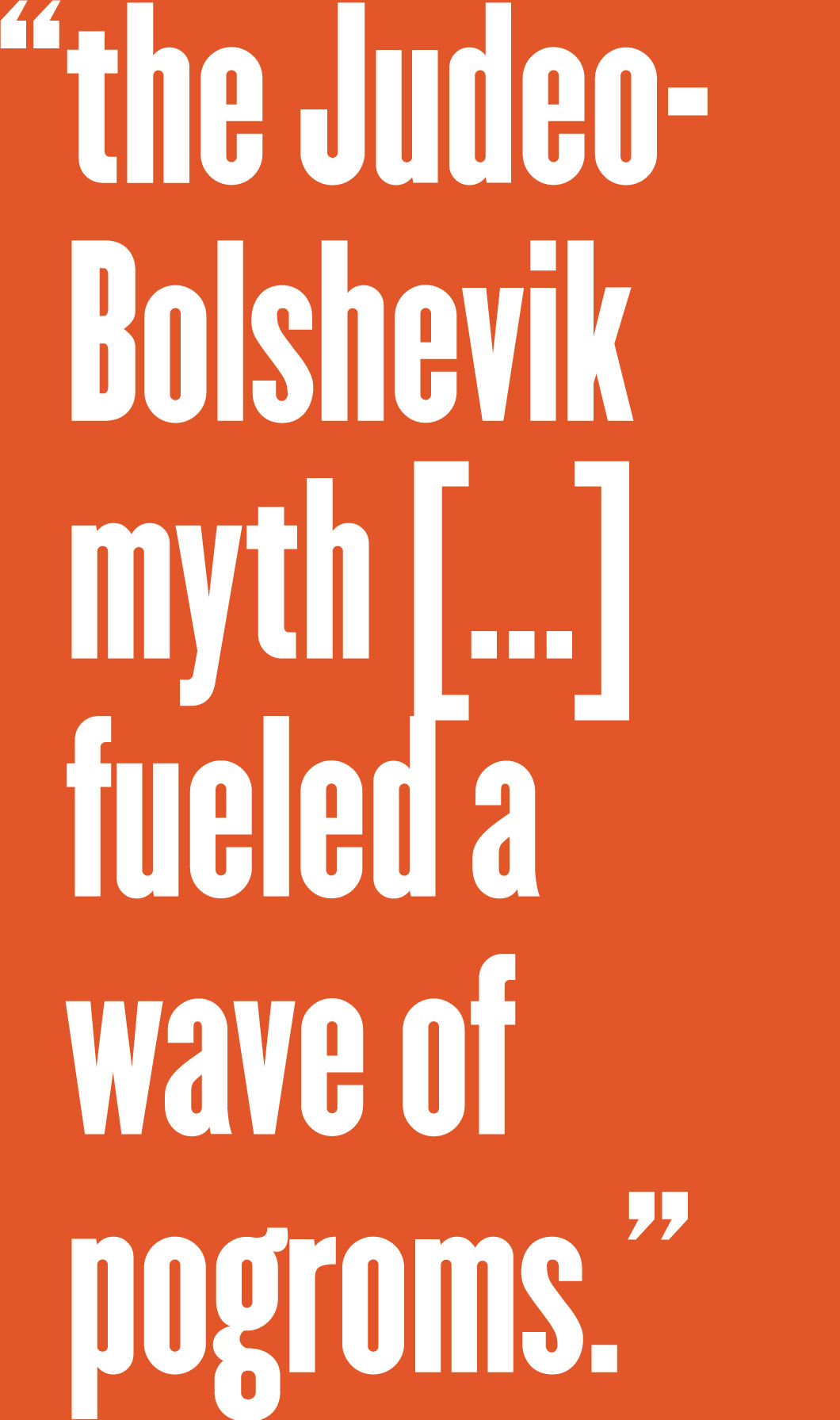
The myth of Judeo-Bolshevism
The myth of Judeo-Bolshevism is a conspiracy theory that claims that Jewish people invented Communism. People who believe this idea use the fact that some Communists were Jews to claim that Jews as a whole provoked revolutions to build their (Jewish) power around the world. According to this antisemitic fantasy, all Jews are responsible for crimes committed by Communists and therefore anti-Jewish hatred and violence is a justifiable response to those (Jewish) Communist crimes.
After the Russian Revolution of 1917, the Judeo-Bolshevik myth circulated across Europe and the Atlantic. Anti-Communists around the world updated older antisemitic conspiracy theories, like the Protocols of the Elders of Zion, to fit the new political situation. They also wrote and translated new books and articles that distorted and exaggerated the role that Jews played in the Revolution. These texts were widely popular, influencing mainstream political debates about immigration, law and order, and national security in countries ranging from Romania and France to the United States and Argentina. In the U.S., for example, fear of a plot by Jewish radicals helped to fuel the “Red Scare” that gripped the country in 1919. Fascists also stoked fears of a Jewish Bolshevik conspiracy to justify calls for discrimination and violence against Jews.
In addition, the Judeo-Bolshevik myth flourished in Christian Churches. After 1917, Catholic and Protestant clergy widely denounced Communism in their sermons as a plot to destroy Christianity. Many of them also connected this idea to older accusations that Jews were enemies of Christian society. During the 1920s and 1930s, religious newspapers in many countries published articles about state-sponsored atheism, famine, and gulags (labor or prison camps) in the Soviet Union. Many of these articles said or suggested that the leaders responsible for these things were all Jewish.
In Eastern Europe, the Judeo-Bolshevik myth was powerful for another reason as well. When the Russian Empire collapsed at the end of World War I, the accusation that Jews supported Bolshevism fueled a wave of pogroms. Multiple armies – some trying to establish new nation-states, and others little more than gangs of marauders bent on looting – attacked Jews as Bolshevik partisans and sympathizers. In many places, local people joined the violence, legitimizing their crimes by labeling them anti-Bolshevik.
Violence against Jews was most intense in the lands of present-day Ukraine, where over 100,000 Jews died by 1921. But there were also pogroms in the eastern Polish borderlands, including in Vilna in 1919, as Polish armies fought Soviet forces to defend the new Polish state. Familiarity of the pogroms cast a long shadow. During the years between the two world wars, nationalists across Eastern Europe continued to stigmatize Jews as disloyal and as Bolshevik sympathizers. Memories of the slaughter also lingered in local communities from Lithuania to Ukraine. This left a legacy of social tolerance for mass violence against Jews that influenced behavior twenty years later in 1941, when Nazi Germany launched a new war against “Judeo-Bolshevism” in the Soviet Union.
Paul Hanebrink, Ph.D., is Professor of History at Rutgers University – New Brunswick. His research interests include the transnational history of Europe, the history of modern East-Central Europe, with a specialization in modern Hungarian history, and the history of nationalism, antisemitism, and religion in modern Europe.